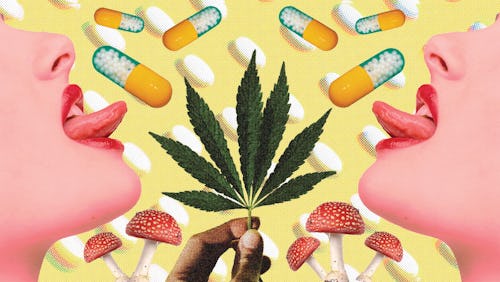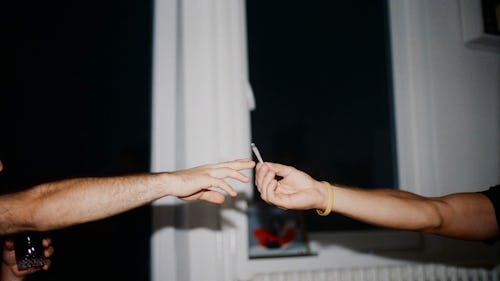
I usually refer to a season I went through several years ago as "cocaine summer." I spent most of it high and dancing or recovering from being high. Every night, I went out with the same dear friend. She was hot and cool and we both loved dancing and talking for hours, bonding over eight balls and shots of Patron. But once the novelty of sinus infections and chronic lack of sleep wore off and the semester kicked in, we didn't hang out as much.
That woman still has a special place in my heart and an invitation to every important event in my life, so it’s not like we’re not friends — we’re just a certain kind of friends. I’ve met her son and I read her books when they come out and sometimes I wish we still had those long nights together. Getting nostalgic about that friend and our great summer together made me wonder: Are “drug friends” — the people we form a substance-fueled connection with — real relationships or are they just a two-person tribute to said substance?
Some experts have compared drug bonding to trauma bonding, but it turns out that it’s more complex than that. “We feel close to people with whom we share any common interests,” says Deena Manion, a California-based therapist who specializes in addiction. “There is a difference between being young and free and experimenting with alcohol or drugs over a summer of fun and building a relationship primarily on partying.” If drugs are all you have in common with someone, Manion says, you may feel empty or eventually long for more out of the friendship.
But sometimes the drug-fueled times in our lives are actually important, even if they’re temporary, and the people we spend that time with are important too. “For me, 2017 was the MDMA year of my life,” says Amelie Gagne, a blogger in Berlin. Gagne was fresh out of a 10-year breakup that left her completely shattered so she moved to Berlin to start fresh. “I was craving some kind of chaos in my life to make me feel alive,” she tells me.
Gagne found the chaos she was seeking in the form of MDMA and a FWB she met on Tinder. “I think we were both somewhere in the eye of the newly-arrived-in-Berlin cyclone that is for many infused with a lot of clubbing and a lot of drugs,” Gagne says. She bonded with her new friend over drugs and sex and the unbeatable high of starting your life over in a new city. Gagne tells me that their relationship lasted until the drugs and Berlin’s harsh winter made it all feel a little depressing.
But, like me and my cocaine friend, Gagne still thinks of that relationship and that time in her life with fondness. Even though Gagne's MDMA friend lives in Sweden, they’re still in touch. “I think both of us still cherish this strange, raw, and beautiful bond of ours that will forever for me have the print of my Berlin landing and the beginning of my new life,” she says.

I feel her on that. Though I joke about it, that summer of cocaine was a major turning point in my life — I switched my focus from academia and scholarship to art and media writing — and that friend was there for all my late night identity crises. It seems, I got the support I needed during that pivotal phase in my life.
I am, for the record, in no way condoning bonding over drugs. Truthfully, some drugs serve our needs and others can completely destroy us, and our mental state at the times when we imbibe as well as the reasons to do so matter. Manion is quick to point out that for people who struggle with addiction, what seems like intimacy with two drug-bonded people could actually be a dangerous form of mutual enabling. “If someone is abusing substances, there is a certain knowing that people [who also abuse substances] can relate to and feel others just cannot understand,” she explains. Those people may understand the “dark side” of using, but not in a way that you want to lean into.
“People who are in active addiction can find themselves easily caught up in a cyclical, toxic relationship trap that is full of tension, abuse, reconciliation and calm,” says Manion. In other words, the relationship dynamics sort of mimic the experience of being addicted and you stay close to a person to get an emotional hit of them rather than for the sake of actual intimacy. The downsides of this kind of relationship seem too obvious to point out — no one wants friends that they’re actually addicted to.
The good news is that if you’re not actually abusing drugs, you probably won’t end up in that kind of disastrous relationship. “People who are healthy do not usually engage in this cycle of abuse,” says Manion. So then many of us may actually be able to make friends over drugs and they might be real friends. The question you need to ask yourself about the friends you use with is: Is this all we have in common? If you can think of three other things that you share with a friend, you’re probably okay.
The truth is that partying is how a lot of us make friends, and sometimes drugs can make the awkwardness of meeting new people a lot less awkward by giving us an immediate path to intimacy. “I don't know how [our friendship] would have been without the drugs, maybe not as deep in a way because we truly shared something special because of it,” Gagnes says of her MDMA-initiated friendship. “We're definitely real friends,” she adds.
If you or a loved one are struggling with addiction and/or want to talk to a professional about resources call SAMHSA's hotline at 1-800-662-HELP. There’s someone there 24/7/365.







